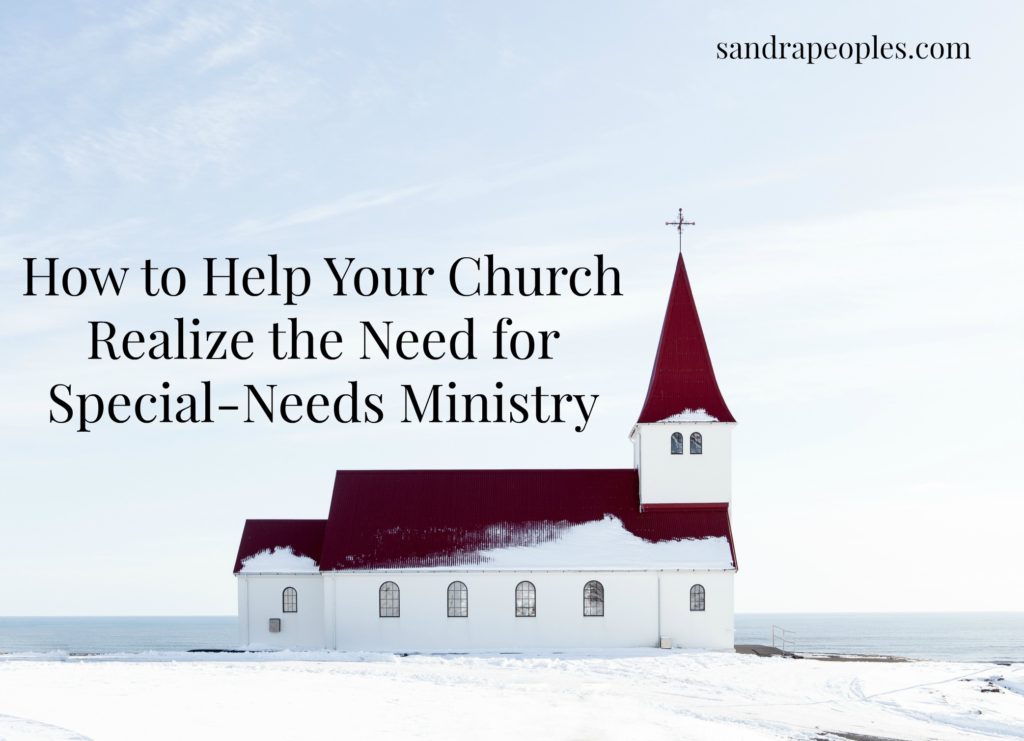In chapter 6 of Acts the church was growing but one group was feeling neglected (the Hellenistic widows). The apostles weren’t doing it with malicious intent, they were simply so busy with the growth of church they didn’t notice. The issue was brought to the attention of the apostles and they responded by appointing men to meet the need. The result—”And the word of God continued to increase, and the number of the disciples multiplied greatly in Jerusalem” (Acts 6:7).
Families impacted by disability often feel like the church leadership is neglecting us. We want to fully participate in church life, but we can’t because the church isn’t meeting our needs. Some are doing on purpose, telling special-needs families they aren’t welcome. But like the apostles with the Hellenistic widows, most church leadership is simply unaware of the needs of special-needs families.

I did a radio interview last week with Martha Manikas-Foster for Family Life and she asked how a church could start reaching special-needs families if they realize they have been either ignoring or repelling them. Here are my ideas:
First, the leadership of the church has to understand the theology of disability. The passages that have shaped my understanding of disability include:
- Psalm 139 – We are all fearfully and wonderfully made
- Exodus 4:11 – God allows disabilities for His purpose
- John 9 – Jesus Himself said that disabilities exist so “that the works of God might be displayed … “
Maybe it’s just never occurred to your church’s leadership to form a theology of disability. It hasn’t impacted them personally, so they’ve just focused on all the other issues they are faced with and have experience with. You can meet with your pastor or email him to share what God has taught you about disability and what an important topic it is for churches to understand. Nearly 1 in 5 families in the U.S. is impacted by disability, so it’s an issue they can’t ignore.
Second, they have to see that people with disabilities are part of God’s purpose for the church. 1 Corinthians 12 teaches us church is made of many parts, and some of those parts are weaker than others but are still worthy of honor, “But God has so composed the body, giving greater honor to the part that lacked it, that there may be no division in the body, but that the members may have the same care for one another. If one member suffers, all suffer together; if one member is honored, all rejoice together” (vv. 24-26). This isn’t to imply people with disabilities are “less than” people without disabilities. But speaking from my experience of having a sister with Down syndrome and a son with level 3 autism, they have limitations that keep them from doing some things in the church, but not all. Churches don’t love and serve people who can best serve them back. They love and serve people (period).
Third, pray for people who already have the calling and skills to work with people with disabilities to step up and serve. As we read in 1 Corinthians 12, a church is made of many parts. I truly believe God has already placed people in churches who can meet the needs of the church members He calls there. At our church in Pennsylvania, our friend who is a occupational therapist took the lead to start a special-needs ministry. Others who had experience as educators, family members, or even people with disabilities themselves served our family and the others who came. At the church we attend now, God had already placed people who felt called to serve people with special-needs. The leadership just had to tap in to a resource that already existed.
I’m optimistic about the future of special-needs ministry, but it’s still going to take some effort on our part, especially in small churches. I hope these ideas help you help your church realize the need for special-needs ministry.


